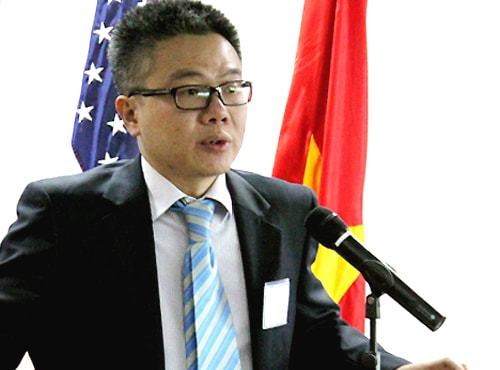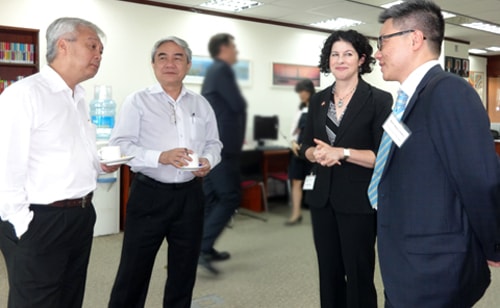Professor Ngo Bao Chau: 'Vietnamese universities do the opposite of the world'
The professor said that university education has fallen behind other countries in the region, and Minister Nguyen Quan said that the problem lies in financial autonomy, and he and the Minister of Education cannot decide on Professor Chau's salary.
"The process of building a teaching and scientific research team at universities in Vietnam is going against the world's process in all steps," Professor Ngo Bao Chau raised the issue at the "University Education Reform" workshop held at the American Center, Ho Chi Minh City on July 31.
 |
| Professor Ngo Bao Chau: "Vietnam is going against the world." Photo: Nguyen Loan |
According to Professor Chau, the way to create human resources in Vietnamese universities is to nurture good students and bring them back to school to become lecturers. Meanwhile, Western universities limit these local candidates as much as possible.
“That is an old and wrong way of thinking because creating such sources is subjective, prioritizing the people you train, not proactively looking for other sources, leading to a lack of competitiveness. A young scientist in Vietnam has almost no other choice but to continue working at the place where his mentor is. Thus, he loses the opportunity to develop, and scientific independence from his mentor is almost non-existent,” Mr. Chau said.
Professor Ngo Bao Chau also said that the process of selecting teaching staff at Vietnamese universities is heavily administrative, following the process of selecting civil servants and state officials without the specific characteristics of an academic environment. Meanwhile, in Western universities, the top criterion is scientific research ability. In addition, the appointment of professors in our country depends on a state agency.
“Recently, the Title Council only recognizes the title of professor, while the appointments are made by the schools. However, I think it is still complicated, the schools still cannot really appoint professors. Without appointing a 'general', it is impossible to have scientific autonomy,” said Professor Ngo Bao Chau.
Regarding the income regime, according to Mr. Chau, this is a complicated issue, and he personally cannot find a thorough answer. “The salary of lecturers is very low in terms of quantity, and the mechanism is also very rigid, leading to complexity and lack of transparency. Lecturers must enjoy the treatment of the middle class. Meanwhile, the current fixed salary does not reflect that,” said Professor Ngo Bao Chau, and proposed to use the income of scientific teaching staff as a criterion to evaluate and rank universities.
Finally, Professor Chau talked about the use of high-level human resources. He cited a famous foreign professor who volunteered to work in Vietnam but did not receive any incentives. Meanwhile, Chinese universities have a large source of funding to encourage and invite retired foreign professors to work for 3 or 6 months.
 |
| Delegates exchanged on the sidelines of the conference. Photo: Phan Linh |
The minister also cannot decide on salary.
The workshop also spent a lot of time discussing the issues of governance and autonomy in universities in Vietnam. Deputy Minister of Education and Training Bui Van Ga said that the Law on Higher Education has given universities a high degree of autonomy, but university leaders are still hesitant in exercising their rights and have not escaped the subsidy mindset.
Sharing the same view, Minister of Science and Technology Nguyen Quan said that, in addition to the subsidy mindset, there are also obstacles from the mechanism. Schools are always under the management of the Ministry, and funding is provided through the management ministry, so they can never be autonomous. Without financial autonomy, all other autonomy is just a formality.
“In a country where I or Mr. Pham Vu Luan (Minister of Education) cannot sign the salary for Mr. Ngo Bao Chau, it is very strange. Mr. Chau’s salary should be decided by him because he is a Director of the Institute for Advanced Research in Mathematics…”, Mr. Quan gave an example that made the whole hall burst into laughter.
After turning to ask about Professor Ngo Bao Chau's salary coefficient, Mr. Quan said: "A salary coefficient of 10 is equal to a minister's salary, but the teachers here say that coefficient 10 is not enough to live on. A professor's salary cannot be decided by the facilities and even the ministry, so what can we talk about the autonomy mechanism?"
Minister Nguyen Quan also said that Vietnam's legal system is the most complicated in the world, and every industry keeps its own laws. The 2013 Law on Science and Technology and the Government's Decree required the Ministry of Home Affairs to assign research positions to universities (currently, universities only have teaching positions).
“We proposed, but the Ministry of Home Affairs responded very coldly that it would only assign positions in accordance with the law on civil servants and public employees, and not assign research positions since 2003. But the Law on Science and Technology, which was enacted later, must be more effective than the laws that came into force earlier. The Ministry of Home Affairs does not assign research positions, so how can the Ministry of Finance have a basis to fund researchers at universities?” Mr. Quan said.
According to the head of the Science sector, achieving autonomy for universities is a thorny and difficult path. The Ministry of Education alone cannot do it, it is the responsibility of many ministries and without a complete and transparent legal system, it cannot be done.
Proposals of Professor Ngo Bao Chau on building a teaching and scientific research team: The decision of the Recruitment Council must be approved by the Rector based on the report of the Scientific Council and the recommendation letter from outside. The recruitment decision and the scientific curriculum vitae of the recruited persons must be made public. The appointment of professors should be the focus of implementing scientific autonomy of universities. Professorship should be widely recognized as a key position, not an honorary title. Relaxing the income system: in addition to the normal income according to the civil servant salary scale, scientific and teaching staff can enjoy special income with sources from within and outside the budget, proactively decided by universities. In the school construction investment plan, in addition to investing in building facilities, it is necessary to prepare funds to invest in building a research and teaching team. Establish mechanisms and policies to “utilize high-quality temporary human resources”. Use achievements in building and improving the quality of the teaching and research team to evaluate the university leadership capacity. Use the income of teaching and scientific staff as a criterion to evaluate and rank universities. |
According to VnExpress
